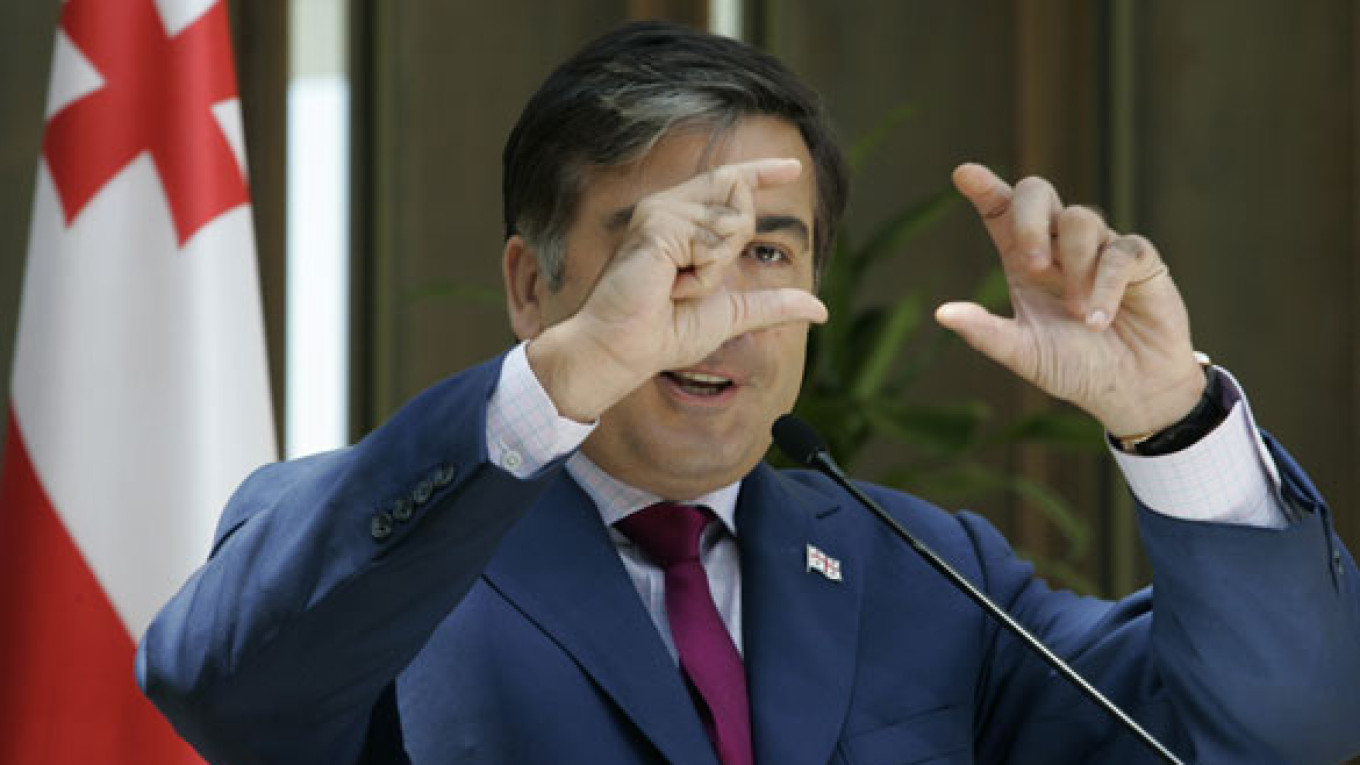Belarussian President Alexander Lukashenko has used Georgian leader Mikheil Saakashvili in a surprising counterstrike against the Kremlin, although analysts said their alliance is unlikely to last.
An interview with Saakashvili, a bitter enemy of the Kremlin, appeared on state-run Belarussian Channel One late Thursday, days after NTV television, controlled by Gazprom, slammed Lukashenko in a documentary on July 4.
The NTV film, “Krestny Batka,” an allusion to both the classic “Godfather” mafia movies and Lukashenko's nickname, accuses the Belarussian president of political repressions, creating a police state and even sympathizing with Hitler.
Saakashvili told Belarussian television that the documentary was “almost trying to accuse Belarussian authorities of being cannibals.”
“It is very sad and has the smell of a propaganda war,” said Saakashvili, who also thanked Belarus for not bowing to Russian pressure to recognize the independence of Georgia's breakaway republics of South Ossetia and Abkhazia.
Saakashvili said Russia could not criticize another country for rights violations since it was guilty of them itself. He cited the unsolved murders of journalist Anna Politkovskaya and human rights activist Natalya Estemirova as examples.
Lukashenko said last week that he met with Saakashvili during a trip to Ukraine earlier this month. But he said no special coalition was planned with Georgia, Interfax reported.
“Our meeting was not aimed against anyone,” Lukashenko said, adding that no one should raise a "fuss” about it.
NTV struck back Friday, when it aired a sequel to its documentary, this time linking Lukashenko to self-exiled businessman and Kremlin arch-nemesis Boris Berezovsky and ousted Kyrgyz leader Kurmanbek Bakiyev, who has found exile in Belarus. The film also claimed that Lukashenko led a playboy lifestyle.
“Lukashenko wants to criticize Putin and Medvedev, and he needs Saakashvili for this,” said Sergei Markov, a State Duma deputy with United Russia.
Yaroslav Romanchuk, an independent Belarussian political analyst, agreed that the purpose of the interview was to “humiliate Putin and Medvedev.”
But he said he did not expect Minsk and Tbilisi to form a stable anti-Kremlin alliance. “All that unites them is their dislike of the Kremlin,” Romanchuk said.
He also noted that the interview could damage Saakashvili's reputation because Georgia has supported Belarussian democratic movements that have been persecuted by Lukashenko.
Relations between Georgia and Belarus have been strained for years, and the countries only established proper diplomatic ties in 2007.
Russian lawmakers were united in criticizing Saakashvili's interview. Duma Speaker Boris Gryzlov called Saakashvili an “outcast” and said the interview will not “affect the relationship with Russia in a good way,” Itar-Tass reported.
Communist leader Gennady Zuganov and Liberal Democratic Party leader Vladimir Zhirinovsky also spoke sharply about the interview.
But Markov said Lukashenko knew that the Kremlin would not go beyond angry words.
“He is needed by everybody," Markov said of Lukashenko. "His country is in the middle of Europe, and it controls [energy] transit routes."
A Message from The Moscow Times:
Dear readers,
We are facing unprecedented challenges. Russia's Prosecutor General's Office has designated The Moscow Times as an "undesirable" organization, criminalizing our work and putting our staff at risk of prosecution. This follows our earlier unjust labeling as a "foreign agent."
These actions are direct attempts to silence independent journalism in Russia. The authorities claim our work "discredits the decisions of the Russian leadership." We see things differently: we strive to provide accurate, unbiased reporting on Russia.
We, the journalists of The Moscow Times, refuse to be silenced. But to continue our work, we need your help.
Your support, no matter how small, makes a world of difference. If you can, please support us monthly starting from just $2. It's quick to set up, and every contribution makes a significant impact.
By supporting The Moscow Times, you're defending open, independent journalism in the face of repression. Thank you for standing with us.
Remind me later.


